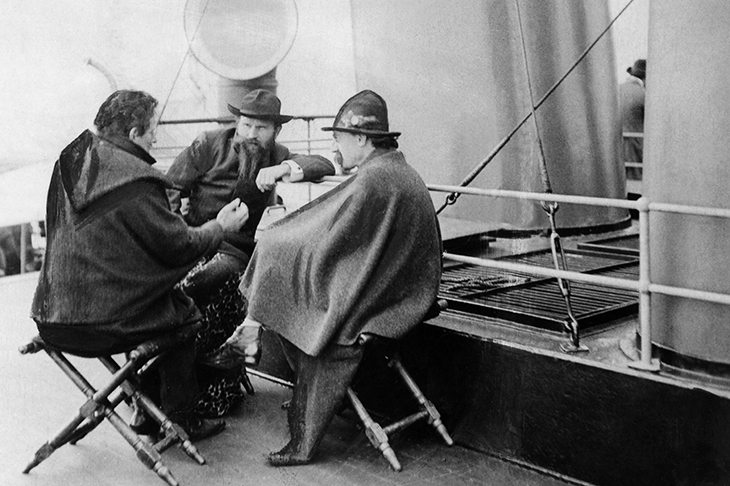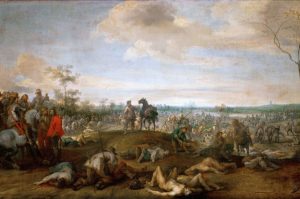Today Munich is a prosperous and peaceful place — Germany’s most affluent, attractive city. Wandering its leafy avenues, lined with handsome apartments and shiny new BMWs, it’s hard to picture anything remotely revolutionary happening here. However, exactly 100 years ago this cosy bastion of conservatism was overrun by one of Europe’s most unlikely revolutions, led by an idealistic theatre critic called Kurt Eisner. For a British equivalent, imagine a socialist insurgency led by Kenneth Tynan. Of course, like all well-intentioned revolutions, it was doomed to fail.
For several chaotic months, Eisner’s Free State of Bavaria teetered between tragedy and farce, before succumbing to a vicious counter-revolution led by the Freikorps, the violent forerunners of Adolf Hitler’s brownshirts. Yet while Hitler’s unsuccessful Munich Putsch has become a staple of school history books, Eisner’s (briefly) successful power grab has been virtually forgotten. Volker Weidermann’s dramatic book brings the turbulent events — and, above all, the frenzied atmosphere — of that bizarre interregnum back to life.
Thankfully for the general reader, Weidermann is a journalist rather than an academic, and so this is a compact and colorful account, with the breathless pace of war reporting rather than the ponderous, long-winded prose one usually associates with German history books by German historians. Many of the proponents wrote extensively and eloquently about their experiences, and Weidermann draws heavily on these first-hand accounts to great effect. By favoring impressionistic reportage over background detail, his narrative is sometimes a bit confusing, but it gives the reader a vivid sense of what it actually felt like to live through this exhilarating and terrifying time.
Weidermann clearly sympathizes with Eisner and his fellow dreamers, but like all good journalists he delights in pointing out the absurdities of their brave new world. One of Eisner’s principal bugbears, nonsensically, was the proletarian appetite for kitsch cabaret, as opposed to highfalutin drama. ‘Politics is as much an art as painting pictures or composing string quartets,’ he declared, airily. Inevitably, his beloved workers didn’t share his elevated vision. As the German poet Ricarda Huch observed, Eisner was merely an abstract moralist — a hopeless highbrow sorely ill-equipped for the brutal Realpolitik of government. ‘Criticism and theory make neither a good ruler nor a good artist,’ she remarked, astutely. ‘One has to be able to do it.’
When elections were finally held, Eisner’s Independent Socialists polled a pathetic 2.5 per cent. Farcically, tragically Eisner was shot dead (by a right-wing terrorist) on his way to tender his resignation. This gratuitous assassination gave him a posthumous popularity he’d never achieved during his lifetime, and lent his utopian uprising a new, albeit short-lived, lease of life. Hitler was among the 100,000 mourners who attended Eisner’s funeral, wearing a red armband, as a soldier in the Soviet army of the Bavarian Free State.
If anything, the politicians who succeeded Eisner were even more unworldly. Ernst Toller had been condemned by psychiatrists as ‘a severe hysteric with a pathological addiction to making himself seem interesting’. Gustav Landauer, his commissioner of Enlightenment & Public Instruction, was more interested in reciting poetry than enacting legislation. ‘Let each discharge his duty, and a general happiness will alleviate each individual trouble,’ he declared, quoting Goethe. Doctor Franz Lipp, the people’s delegate for foreign affairs, had a morbid fear of telephones, and was declared insane after sending a telegram to the Pope complaining that Karl Hoffmann, the leader of Bavaria’s government in exile, had taken the key to the lavatory with him when he’d fled.
Like a Teutonic Haight-Ashbury, Munich was soon flooded with all sorts of cranks and do-gooders. ‘Some believe that the root of all evil is eating cooked food, others the gold standard, others non-porous underwear,’ wrote Toller, despairing of the torrent of quackery his colleagues had unleashed. Like monkeys typing Shakespeare, they chanced upon a few worthwhile schemes. Landauer abolished corporal punishment in schools — pretty progressive for 1919. He also abolished homework, arguing (correctly) that it made schoolteachers lazy. Silvio Gesell’s economic theories inspired John Maynard Keynes. Yet for every good idea, there were numerous bad ones, most notably draconian assaults on savings and private property. When the Freikorps marched into town, they met insufficient resistance. It turned out that the proletariat didn’t want to live in a socialist paradise after all.
In the resultant bloodbath, around 1,000 people were slaughtered. This set the moral tone for Hitler’s Munich Putsch a few years later, and, ultimately, the Third Reich. Whatever their failings (and there were many), at least Eisner’s dreamers meant well, which is more than can be said for the sadistic Freikorps. ‘Civil war is violence of the most potent kind; moderation is stupidity,’ wrote Manfred von Killinger, a Freikorp (and later a Nazi member of the Reichstag) in his memoir, Serious & Humorous Incidents from Putsch Life. Toller escaped and fled to America. ‘You cannot just avoid reality when it is different from what you wished it to be, and excuse yourself by saying: that was not what I intended,’ he reflected, sadly, wisely, in his memoir, I Was a German. He committed suicide in 1939.
This article was originally published in The Spectator magazine.


















